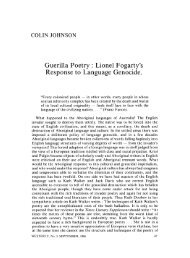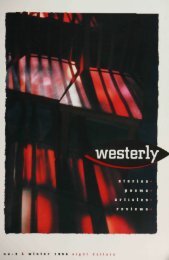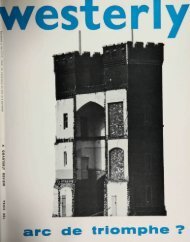So grown you looked, in the same unalteredroom,so much of your childhood you were alreadyforgetting,while I remembered. Yet in the unforgettingdreamyou will come here all your life for renewaland meeting.It was your breath, so softly rising andfaUing,that kept me silent. With your lids hke budsunbrokenyou watched on their curtain of your life, astream of shadows moving.When I touched your shoulder, I too had alittle dreamed and woken.It may be said that Judith Wright, howeverdeeply she feels, however much she is movedby the transience of life or the eternal questfor its underlying truths, will never and cannever be dogmatic in her statement. A briefpoem, "Wishes"- gives her answers to the questions:What do I wish to be? What do I wishto do? To the first she replies, "I wish to bewise". To the second, "I wish to love". Thefinal couplet admits the contradiction:To love and to be wise?Down, fool, and lower your eyes.There are several remarkable poems in thisvolume. The title-poem is yet another attemptto bring about some reconciliation of oppositeswhich we have noted before. This time theopposites are "the self that night undrownswhen I'm asleep" and "my daylight self", thesubconscious and the conscious. She bringsthem tentatively together again in a finalcouplet:So we may meet at last, and meeting bless.And turn into one truth in singleness.We should perhaps have noted earlier thisrecurring practice of summing up in a coupletthe ideas that the poem has been exploring.In this she is not uniformly successful. Thereare times when one feels that in her desire toround off a poem as neatly as possible she hasyielded a little to rhetoric, a little to emotion.In this couplet I have quoted, one may wellwonder whether these two opposites can bereconciled in singleness.The outstanding poems in The Other Halfare "To Hafiz of Shiraz", "Naked Girl andMirror" and the New Guinea sequence, "TheFinding of the Moon". I name these threebecause of certain intrinsic differences aboutthem, but would not suggest that any othersin the volume fall short of the high standardof thought and expression that characterize allJudith Wright's verse. She is, it seems, too finean artist ever to write a bad poem; if somereach greater heights than others it is becauseinitially they are aimed at greater heights."To Hafiz and Shiraz" is prefaced by thestatement- "the rose has come into the garden,from Nothingness to Being", which reminds ussomewhat of an earher poem, "Dark Gift". Itsphilosophical theme is the inevitability of fruition,so that it is no longer "any poem" thatmight follow her pen, but the certainty that inpoetry, as in living:Every path and life leads one way only,out of continual miracle, through creation'sfable,over and over repeated, but never yetunderstood,as every word leads back to the blindingoriginal Word."Naked Girl and Mirror" must take its placeamongst Judith Wright's finest poems. It is areflective essay on the problem facing an adolescentgirl whose body once served only theelemental needs of childhood, but is nowawakening to the fuller needs of maturity andlove. This she sees at first as a betrayal andis afraid. She longs to return to what she was,but finally realizes that she cannot do this, althoughshe still hopes to retain something ofher original self:Let me go—let me be goneYou are half of some other who may nevercome.Why should I tend you? You are not myown;you seek that other—he will be your home.Yet I pity your eyes in the mirror, mistedwith tears;I lean to your kiss. I must serve you: I wiUobey.Some day we may love. I may miss yourgoing, some day,though I shall always resent your dumb andfruitful years.Your lovers shall learn better, and bitterlytoo,if their arrogance dares to think I am partof you.In the New Guinea sequence, "The Findingof the Moon", she captures to an extraordin-50 WESTERLY, No. 1, MARCH, 1968
ary degree the atmosphere of a tribal village inwhich a young man, Aruako, turns his backEndymion-like on sensual love in his pursuitof the Moon. It is notable that Miss Wrightshould depart from her familiar Australianbackground and that she should with her ownpoetic vision so successfully enter into this newworld. There are some poems here with aquaintly domestic atmosphere that perhaps donot quite do justice to her talents—poems like"To Another Housewife", "Cleaning Day" and"Portrait", but others, although comparativelyslight- like "The Trap", "A Document" andSnakeskin on a Gate", show that she has lostnothing of her technical skill or sensitivity.In short. The Other Half is a worthy successorto the volumes that have preceded it. No doubtit will be followed by others if we are to judgefrom her supplication in the final stanza of"Prayer":And you, who speak in me when I speakwell,withdraw not now your grace, leave me notdry and cold.I have praised you in the pain of love, Iwould praise you stillin the slowing of the blood, the time whenI grow old.What then is the real nature of the genius ofJudith Wright? Always she has worked withincertain specified limits. Most of her poems arequite short. She has never attempted the epicand has touched only incidentally, through therecalled past, on the heroic. Once or twice shehas been tempted towards the slightly satirical("Eve to her Daughter" in this latest volumeis an example), but not very successfully perhapsbecause this is not fundamentally part ofher nature. In the main she has blended theemotions and the intellect, and throughout hasdeveloped technical skills which, in spite ofattempts by some critics to find influences ofBlake and Yeats and T. S. Eliot, have remainedpecuharly her own. Not the least of her skillslies in the felicity of her choice of word andphrase and the ability to say a great deal invery few words. Let any who doubt this comparethe examples I have given with the languagein most other contemporary volumes ofAustralian poetry.We have seen how her first two books causedH. M. Green to classify her as a lyricist andhow her next two caused him to amend thatclassification. We have seen how early criticsapplauded her regional poetry and how somelater ones regretted her partial abandonmentof the regional for the universal. Throughouta now considerable number of volumes she hasestablished for herself an identity which doesnot easily fit into any category, but it is clearthat she is fundamentally a mystic, seekingthrough her own personal experiences to findthe true significance in all creation of Loveand the Word, which in the last analysis aresynonymous. That she gives no final answeris not the least of her virtues, since this carrieswith her a company of readers prepared to goalong with her in her quest. There are alsomany, no doubt, who are less concerned withthe quest, but equally prepared to accompanyher because of the unique quality of the poetrywhich she uses to pursue it.References:1 Meanjin, Vol. 5, No. 3, 1946, p. 249.2 Southerly, Vol. 8, No. 3, 1947, pp. 182-3.3 Modern Australian Poetry, ed. by H. M. Green.Introduction to 2nd edition, p. vi.4 A History of Australian Literature, by H. M. Green(1961), Vol. 2, 1923-1950, p. 943.5 Southerly, Vol. 16, No. 1, 1955, p. 35.6 Meanjin, Vol. 17, No. 3, 1958, p. 247.7 Southerly, Vol. 17, No. 2, 1956, p. 99.8 Meanjin, Vol. 15, No. 2, 1956, pp. 202-3.9 A History of Australian Literature, by H. M. Green(1961), Vol. 2, 1923-1950, p. 937.10 Ibid. p. 1402.11 The Australian Book Review, Vol. 2, No. 6, p. 90.i2 Jindyworobak Review (1948), pp. 72-3.13 Ibid. p. 73.14 See note 6, above.15 See note 5, above.16 The Literature of Australia, ed. by Geoflfrey Dutton(1964), p. 361.17 See note 4, above.WESTERLY, No. 1, MARCH, 1968 51
- Page 1 and 2: westerlyA QUARTERLY REVIEW PRICE 60
- Page 3: westerlya quarterlyreviewEDITORIALC
- Page 6 and 7: Some JOURNALS published byUNIVERSIT
- Page 8 and 9: "WeU, maybe this one is, too.""With
- Page 10: a leer. What really infuriated her
- Page 13 and 14: Guest of honour? No less than the G
- Page 15 and 16: THE NAVIGATORS(To Albert Tucker)Bei
- Page 17 and 18: Mother of navigators.Beater of men.
- Page 19 and 20: Horizon-haunted men.Looters and Pir
- Page 21 and 22: On the table Taki had left a crumpl
- Page 23 and 24: FEARA thousand, thousand stars and
- Page 25 and 26: Judith ClarkeTHANK YOU MRS. GREENBE
- Page 27 and 28: Oh no, thought Lai Chandra, oh no.
- Page 29: "Nuance," she said- and "poetry,"an
- Page 32 and 33: TO WAKE, TO FLOWfor my wifeFor me t
- Page 34: With apparent indulgence Lola encou
- Page 39 and 40: or another, and some of the paintin
- Page 41: I do not think it has been fulfille
- Page 45 and 46: important thing for a writer who ha
- Page 47 and 48: from which she herself had sprung.
- Page 49 and 50: They are looking for him now in the
- Page 51: departure from what had come to be
- Page 56 and 57: Blessed is the mother with her chil
- Page 58 and 59: IF YOU DON'T KNOW HOWDON'T DO ITft>
- Page 60 and 61: And yet perhaps both men drew from
- Page 62 and 63: other respects his attitude was mor
- Page 64 and 65: clearing and, as they are usually t
- Page 66 and 67: WHAT IS THECRITIC?The Critic is a c
- Page 68: JOHN KEATSBronze cast from a life m







